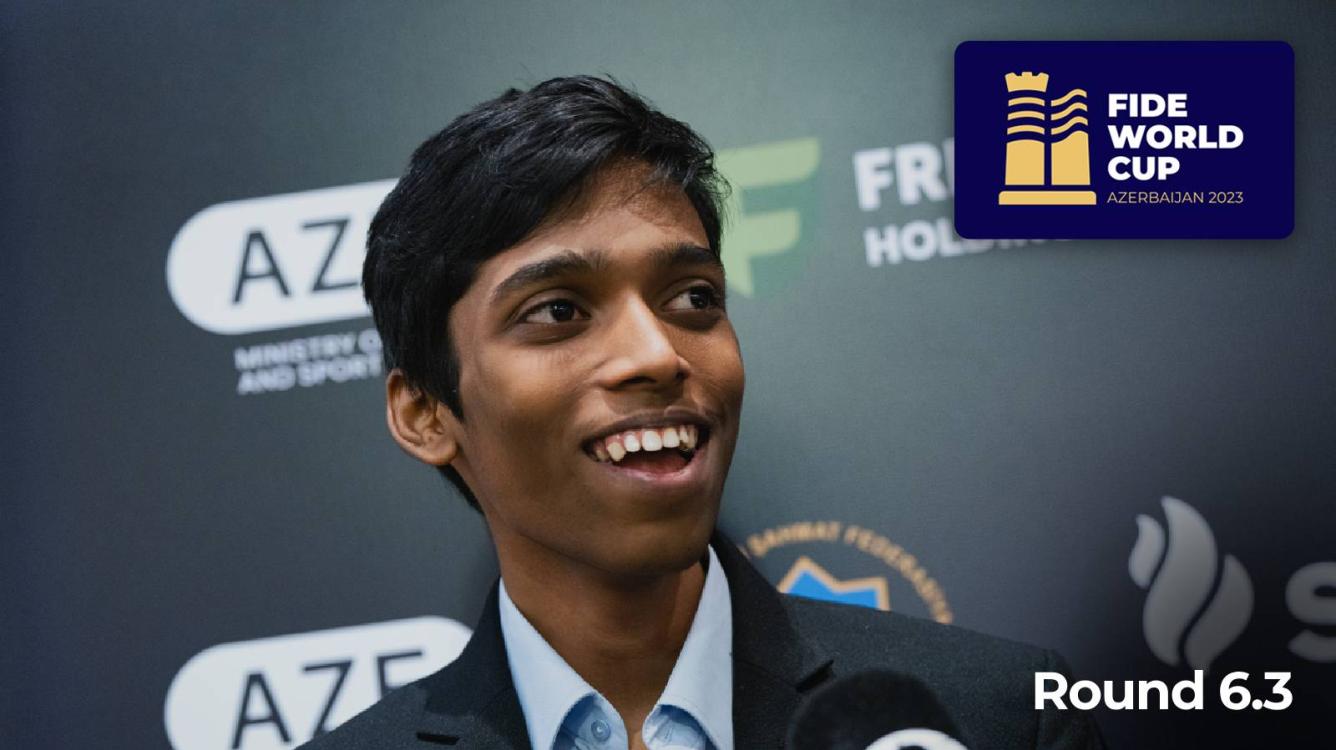
Praggnanandhaa Prevails In Dramatic Tiebreak; Salimova Continues Dream Run
GM Praggnanandhaa Rameshbabu and GM Arjun Erigaisi were engaged in 1-1 deadlocks in three sets of tiebreak games at the 2023 FIDE World Cup. After two draws in the 25+10 rapid tiebreaks, Praggnanandhaa twice took the lead by winning the first game of the 10+10 rapid tiebreaks and the 5+3 blitz tiebreaks, both with black pieces. Both times, Arjun staged dramatic comebacks with wins on demand to level the score, with black victories of his own. Finally, Praggnanandhaa won the 3+2 blitz tiebreaker with White after arriving 30 seconds late to emerge as the winner of the match with a combined 5-4 score after a nine-game marathon of fierce fights.
He will now face GM Fabiano Caruana in the semifinals after a rest day, while GM Magnus Carlsen and GM Nijat Abasov will square off in the other semifinals.
Bulgarian IM Nurgyul Salimova continued her dream run in the 2023 FIDE Women's World Cup, outwitting higher-seeded GM Anna Muzychuk by prevailing 1.5-0.5 in the 10+10 rapid tiebreaks after the 25+10 rapid tiebreaks ended in a 1-1 deadlock. Thus, Salimova triumphed on a combined match score of 3.5-2.5 points. The match almost shaped up to be a clash between Salimova's aggression and flamboyance versus Muzychuk's depth of logical understanding, as Salimova powered her way through in all three tactical battles of the day. She is now assured of a place in the 2024 Women's Candidates and will face Aleksandra Goryachkina in the finals.
The first games of round seven will begin Saturday, August 19, at 7 a.m. ET / 13:00 CEST / 4:30 p.m IST.
Open Section: Arjun - Praggnanandhaa
Speaking on the live commentary channel after the game, Praggnanandhaa praised Arjun's opening preparation. "Arjun is always very well prepared with both colors, and especially with Black, he is very strong. He has these rapid and blitz repertoires as well! To fight that is very hard."
The match initially proceeded on the very lines, as pointed out by Praggnanandhaa. Arjun indeed impressed with his opening preparation in the first four games of the tiebreak matches, introducing creative, sometimes even quirky concepts on the board, invariably gaining valuable time on the clock in the process. To his credit, Praggnanandhaa kept his composure and reacted with common sense in most of the situations, and finally won the match when he got a satisfactory position out of the opening in the final tiebreak game.
25+10 rapid tiebreaks:1-1
Arjun seemed to have come well-armed for the first game, as he blitzed out his preparation well into the endgame from the Qc2 variation of the Nimzo Indian Defense. It proved to be a typical game of a memory contest between two top players with thorough preparation, as Praggnanandhaa kept the position equal, though consuming a little more time. In the otherwise evenly matched game, there was one moment of curious complexity in the endgame:
Arjun showed the depth of his preparation, reaching this position having hardly spent any time on his clock, while Praggnanandha's clock showed only six minutes being left. At this point, the chess engines pointed to 28...Qf5 as a clear-cut path to equality, indicating that the likely rook endgame after 29.Qxf5 exf5 30.Rd6 Ra2 31.Rxa6 to be a theoretical draw. A curious case of machine-cognition of chess.
In the actual game, after Praggnanandhaa's 28...Ra2, Arjun allowed 29.Ra4 Qb2, after which Black produced enough counterplay.
The beginning of the second game left the spectators and commentators deeply perplexed as Arjun played a curious concept in the opening:
In what appeared to be a standard Carlsbad structure position of the Orthodox Queens Gambit Declined opening, Arjun continued with 4...Ne7!? 5.e3 Ng6 6.Bg3 Nh4!? 7.Nf3 Nf5!? and finally captured the bishop on g3 with his knight after a couple of moves. Arjun spent a total of five moves with the knight at the opening stage of the game, buying seven minutes of his opponent's clock.
Commentator Leko described the proceedings with deep perplexity, "Wow! Black goes (4...)Ne7, which I have never seen in my life. This is the typical Arjun... He likes to go for these very interesting, unknown kinds of lines."
7...Nh4 is the kind of move a coach would teach a beginner not to play ("don't move your pieces twice in the opening", "don't attack with a single piece") but such is modern chess at the top level! https://t.co/ys2tGHfLkD #FIDEWorldCup pic.twitter.com/LrMx0VepeM
— chess24.com (@chess24com) August 17, 2023
Praggnanandhaa followed up with pragmatic play and achieved a draw in the endgame.
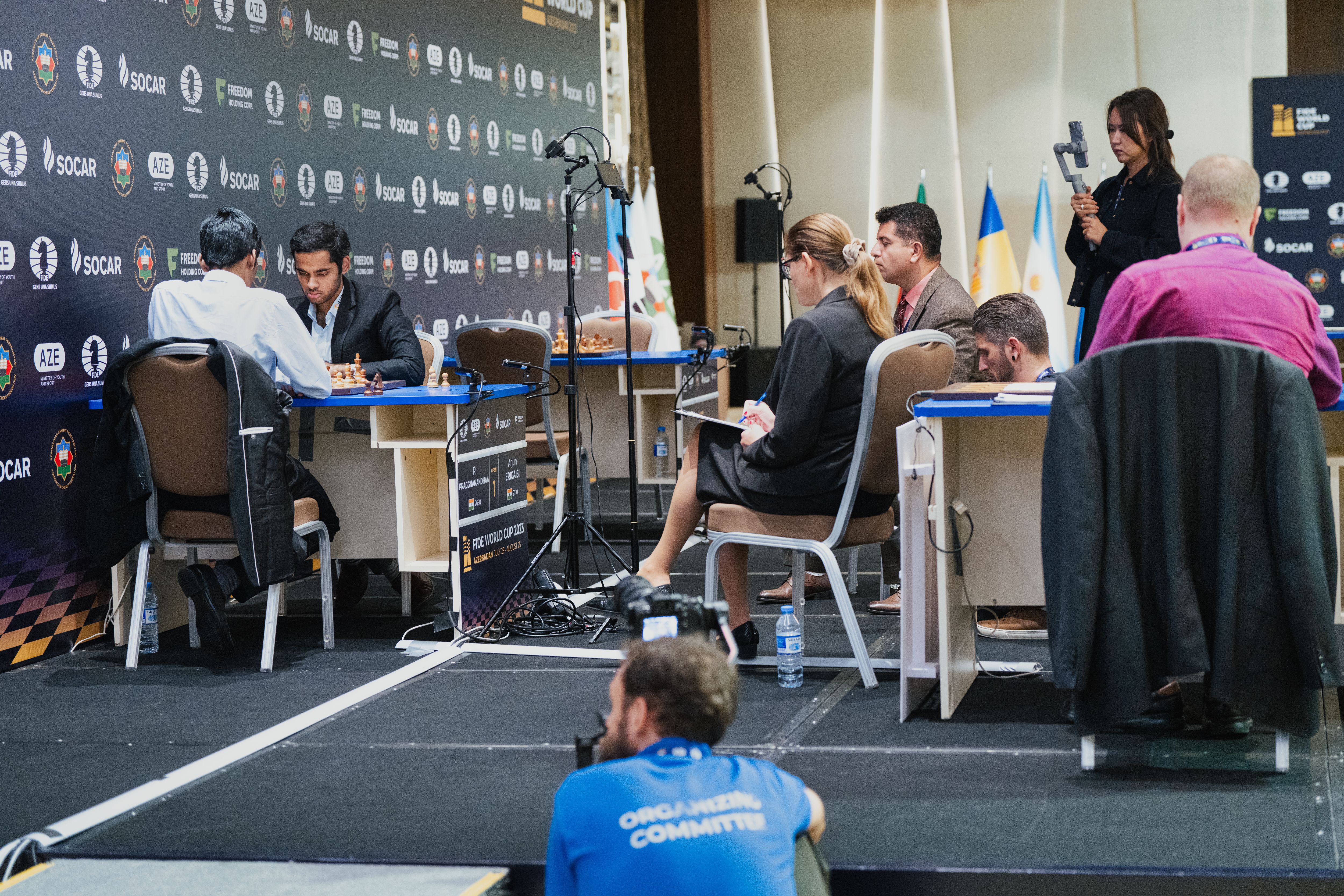
10+10 rapid tiebreaks:1-1
The first game broke into a creative melee from the get-go. Arjun decided to let his hair down and played the Center Game opening, where he employed unorthodox choices right from the start, which were frowned upon by chess engines, setting the stage for a dramatic game:
Just like the previous game, once again seemingly violating established positional principles, he answered 5...Be7 with 6.c4!?, which set the stage for a delightful creative play by the players. The game saw an amazing clash of ideas, which made Leko observe, "Chess is crazy!" and Howell replied, "The skill level of these players is crazy... So tenacious, so resourceful."
The game proved to be a brutal hand-to-hand combat typical of a rapid game:
After this unfortunate loss, just like his opponent in the classical games of the match, Arjun found himself in the daunting task of winning with the black pieces. A feat he achieved with surprising ease, once again with the help of his opening preparation:
5+3 rapid tiebreaks:1-1
Ironically, for all his exhibited home preparation thus far in the match, Arjun mixed up his move order in the opening in the first game of the third set of the tiebreaks. In the Italian Opening, he seemed to have committed a fingerfehler with 8.a4, after which Praggnanandhaa seized the initiative with aggressive play on the kingside and won a smooth game:
Once again, Arjun was faced with the task of winning with Black, and once again, he made it. Like before, he showed clever preparation in the opening, though the game got messy afterwards:
3+2 blitz tiebreaks:
From this point onward, the tiebreak was not a set of two games but only one blitz game, with the winner taking the match. A different format compared to the Armageddon tiebreak system followed in the majority of events.
And with so much at stake, there was a lot of drama before the start of the game, as the clocks got started before Praggnanandhaa made himself present at the board. Even Arjun was visibly uncomfortable at the board, having started his opponent's clock.
Praggnanandhaa on why he arrived 30 seconds late to the crucial final blitz game!#FIDEWorldCup pic.twitter.com/teEyByYDtc
— chess24.com (@chess24com) August 17, 2023
Finally, Praggnanandhaa arrived about 30 seconds late but took control of the game from the get-go, deservingly winning a well-played game to advance to the semifinals of the World Cup.
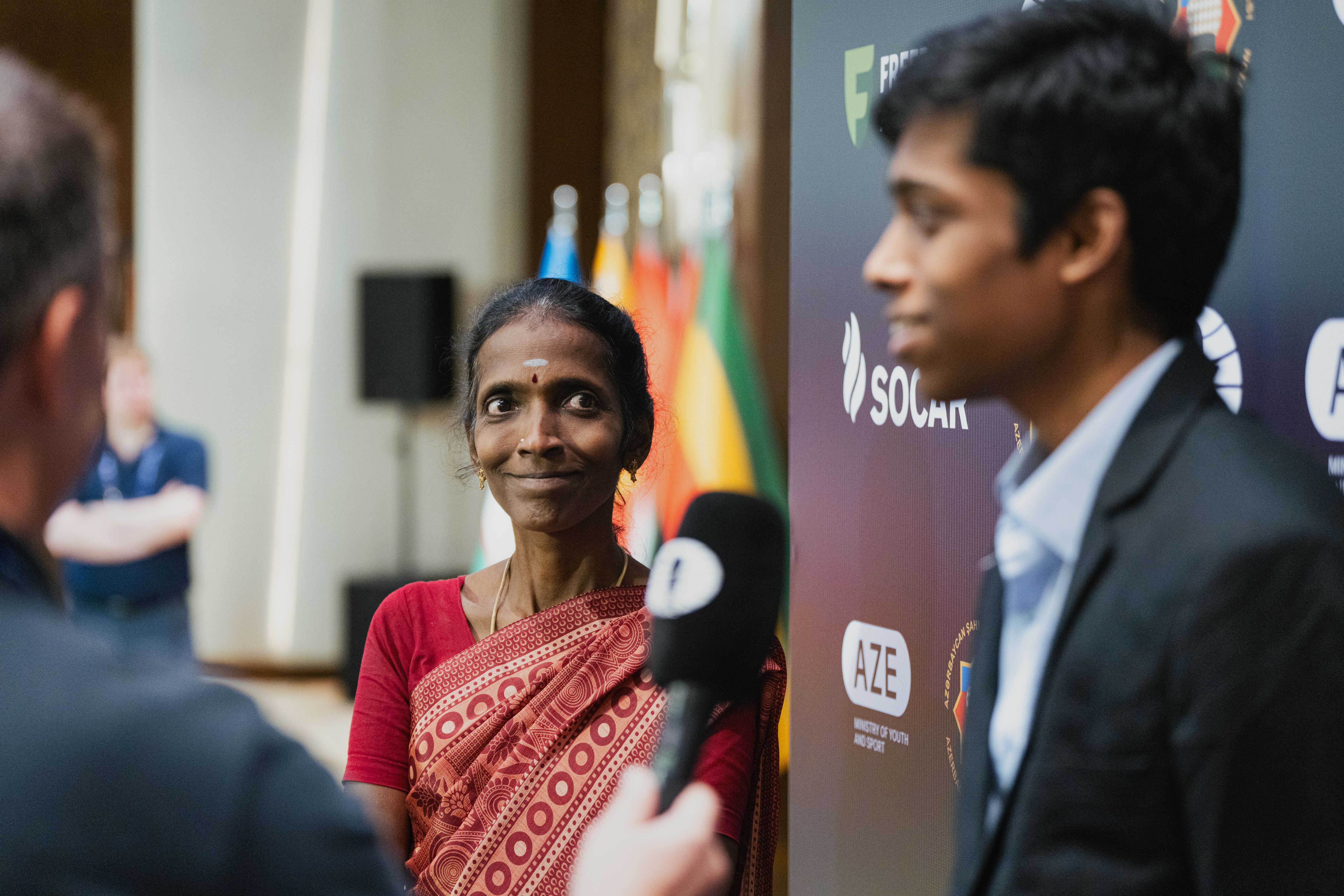
Quarterfinals Results: Open

All Games: Open Quarterfinals Tiebreaks
Women's Section: Muzychuk-Salimova
Now that this match reached the tiebreaks, the competitive element became even more curious when more connections between the players were revealed. Apart from being teammates in the Bundesliga, the protagonists had another association between them too:
Two years ago, during the pandemic, Anna Muzychuk was coaching Nurgyul Salimova for the Challengers Chess Tour! Now they're playing a #FIDEWorldCup semi-final pic.twitter.com/sRlf88VrKh
— chess24.com (@chess24com) August 17, 2023
From the way she has progressed to the semifinals, Salimova has displayed excellent form. Still, her opponent Muzychuk is a grandmaster, ahead by about Elo 100 points in rating. Thus, there was no doubt that the match could go either way, which was proven so from the beginning.
25+10 rapid tiebreaks:1-1
Muzychuk showed her class right from the first game when she showed admirable preparation. Though Muzychuk played 12.d5 after two minutes of thought, the idea seemed to be fresh, and White seemed to be dominating the game.
When Salimova sacrificed a pawn in return, it created a lot of excitement, but the commentators were not wholly impressed with her decision.
When Howell opined, "It looks like Muzychuk is very well prepared," Leko replied, "It looks like a desperate sacrifice. I don't really feel Black has any serious compensation. It seems like Muzychuk outprepared her opponent." But as the game progressed, drama ensued.
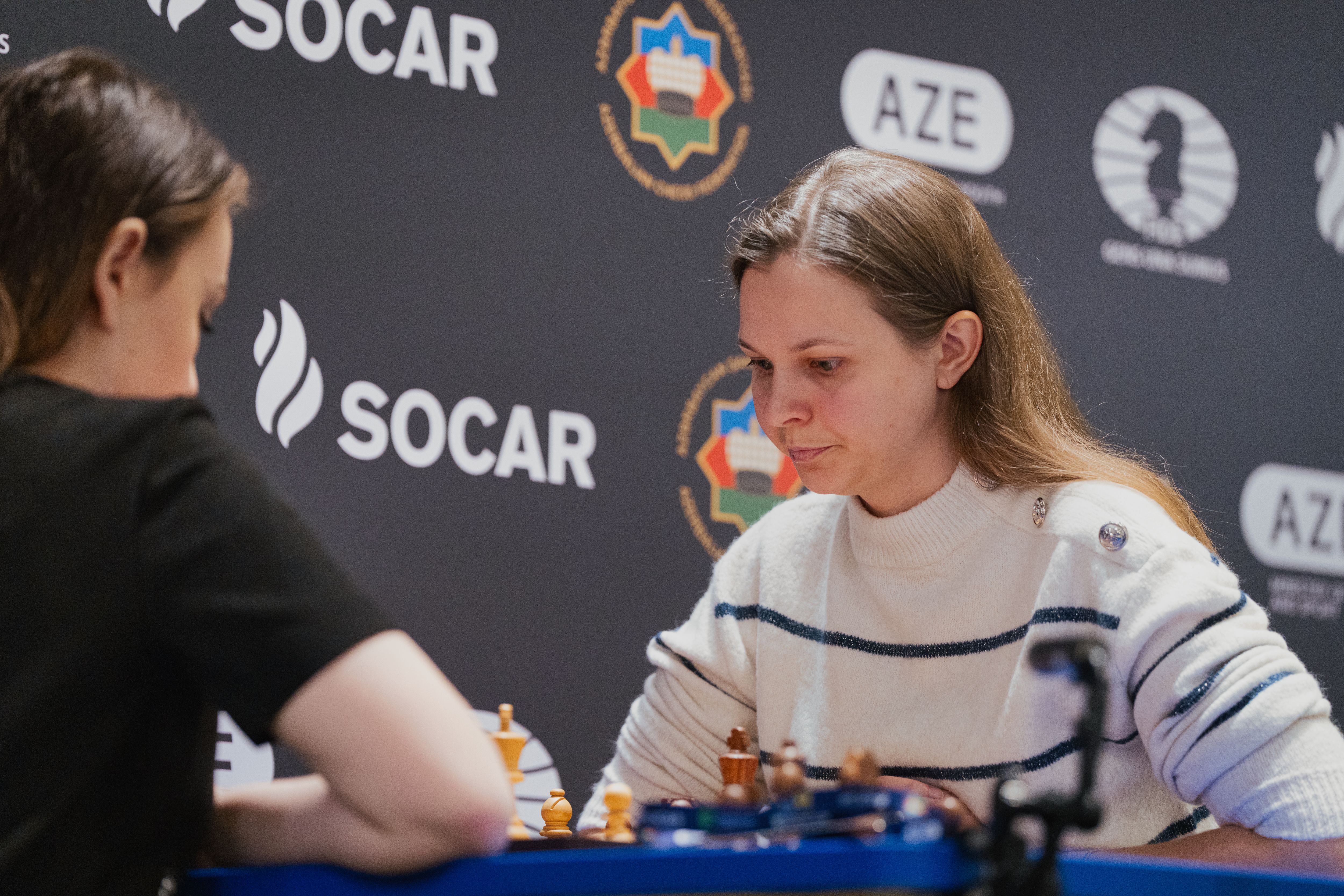
This excellent fighting game is our Game of the Day, annotated by GM Rafael Leitao:
The game produced lots of excitement, especially for the energetic way Salimova played:
A brilliant rook sacrifice by Salimova — Anna wrongly accepts it! https://t.co/ybe31kncX9 #FIDEWorldCup pic.twitter.com/NxkeYeg7Sl
— chess24.com (@chess24com) August 17, 2023
Finding herself in the unenviable situation of having to win with the black pieces, Muzychuk adopted the Dutch Defense in the second game.
Leko summed up the unfolding play succinctly, "This is what (Muzychuk) has to do. She has to be feeling the moment. I just can't play normal chess. I have to go all out. It is risky, objectively... not sound. As a player with such class like Anna, it is not easy psychologically to do something like this, but she does understand the importance of the situation. Critical situations call for drastic measures."
Critical situations call for drastic measures.
— Peter Leko
Salimova responded to the opening choice with a safety-first attitude, understandably keeping the position simple. But, slowly increasing pressure, Muzychuk showed her class at an important juncture:
It required good judgment to decide on a possible queen exchange, as excessive simplification might've lead to equality, which meant that Muzychuk faced the prospect of being eliminated from the match. However, it ended in a topsy-turvy win for Muzychuk:
Muzychuk's play came in for praise from Leko: "One has to admire the incredible qualities of Anna: fighting spirit, keeping composure, keeping her nerves at check... Basically a perfect game—all her decisions were excellent!"
10+10 rapid tiebreaks:
The first game of the 10+10 time control proved to be the most pivotal of the match, as Salimova played energetically right from the get-go. In one particular moment of the game, Salimova found an excellent way to open roads toward the black king:
This was probably the moment that proved that Salimova deserved to win the match and a place in the Women Candidates 2024. She demonstrated sheer enterprising play in the whole game:
The final game proved to be another disappointment for Muzychuk, as she couldn't find a successful way to conduct an attack on the black king and blundered in a tense position:
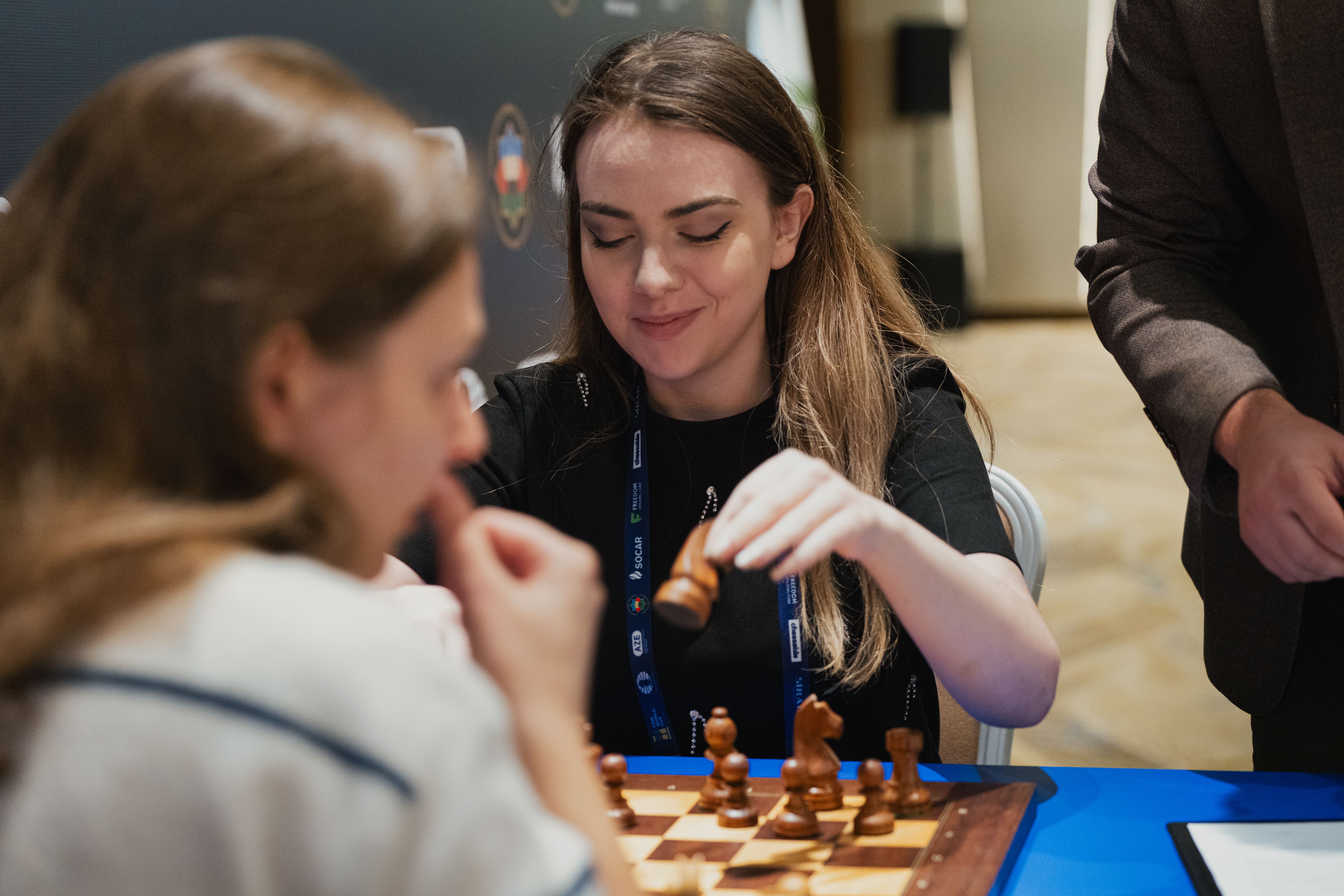
A happy Salimova also revealed that GM Nijat Abasov and GM Cem Kaan Gokerkan have helped her to succeed in the event:

Semifinals Tiebreak Results: Women
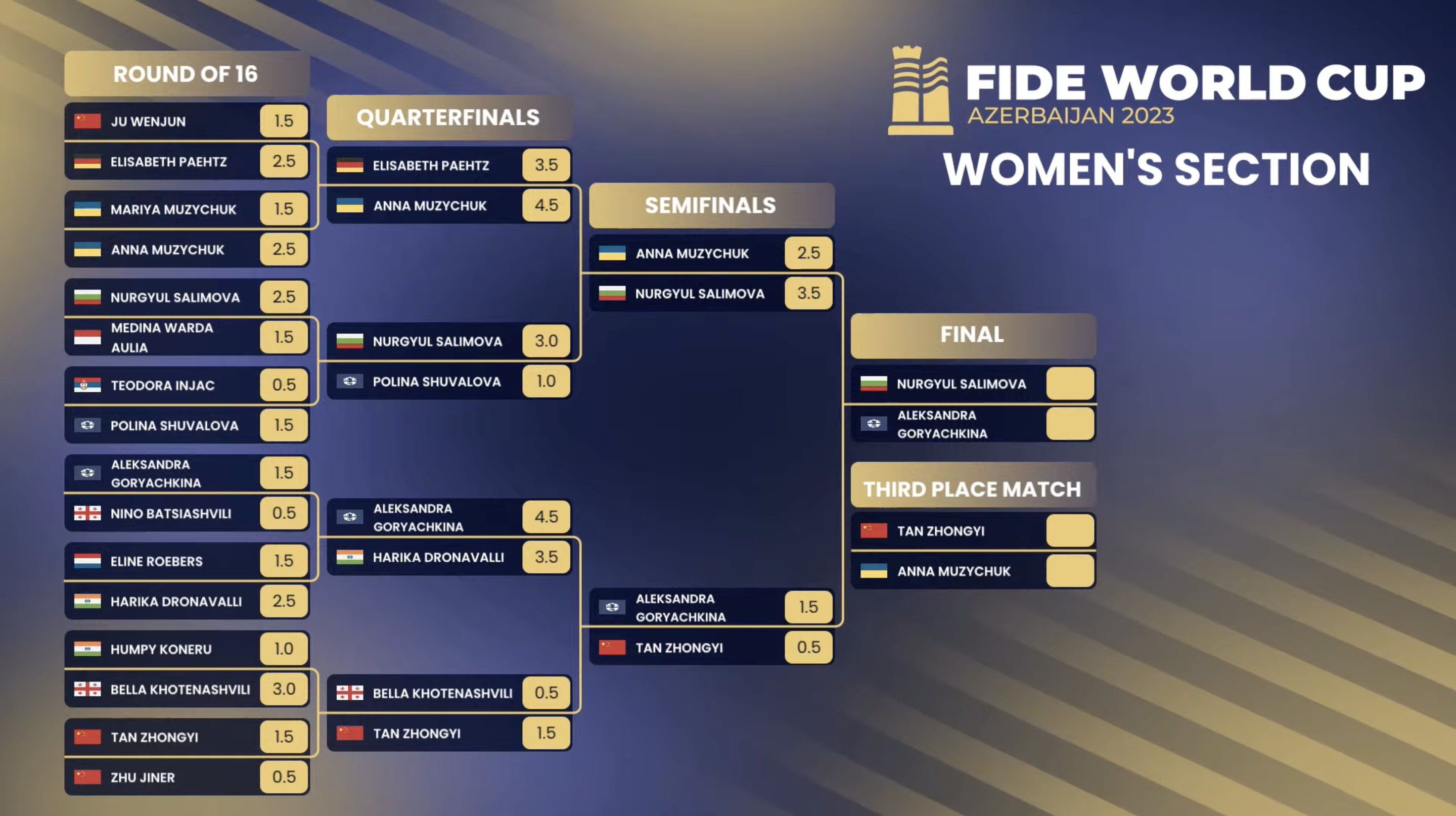
All Games: Women's Semifinals Tiebreak
After a rest day, the action returns with round 7, with Carlsen-Abasov and Caruana-Praggnanandhaa in the semifinals in the open section. The Women's section will see Goryachkina-Salimova in the finals, with Muzychuk-Tan as the third-place match.
The 2023 FIDE World Cup and Women's World Cup in Baku, Azerbaijan, are big knockout events that will determine six spots in the 2024 FIDE Candidates Tournaments. The action begins July 30 and ends August 24, with a combined $2.5 million prize fund.
-
- Round 6.2: Abasov Continues Miracle Run On Home Soil To Join Carlsen, Caruana In Semifinals
- Round 6.1: Carlsen, Arjun, Goryachkina Score In A Day Of Big Fights And Black Wins
- Round 5.3: Vidit Beats Nepomniachtchi As 4 Indian Players Reach World Cup Quarterfinals
- Round 5.2: Praggnanandhaa, Gukesh, Arjun Make History For India
- Round 5.1: Carlsen, Gukesh Strike Again; Quarterfinal Showdown Looms
- Round 4.3: 18-Year-Old Praggnanandhaa Knocks Nakamura Out Of World Cup
- Round 4.2: Carlsen Strikes Back, Caruana In Last 16
- Round 4.1: Carlsen, So On Brink Of World Cup Exit
- Round 3.3: Giri Gone, So Survives, Kosteniuk Knocked Out On Tense Day Of Tiebreaks
- Round 3.2: MVL Exits World Cup; Close Calls For Caruana, Ju
- Round 3.1: Svidler, Carlsen Cruise to Victory; Roebers on Perfect Score
- Round 2.3: Grischuk, Lagno Exit World Cup As Nakamura, So Survive
- Round 2.2: Mamedyarov, Abdusattorov, Shankland Crash Out Of World Cup
- Round 2.1: Carlsen, Caruana Start Fast, Praggnanandhaa Plays Masterpiece
- Round 1.3: Suleymanli Wins Epic Tiebreak As Carlsen, Nakamura Gear Up For Action
- Round 1.2: Favorites Strike Back As 33 Tiebreaks Await
- Round 1.1: Stunning Start By Ediz Gurel, The World Cup's Youngest Player
- Carlsen Goes For First World Cup Win
- FIDE World Cup 2023: All The Information


